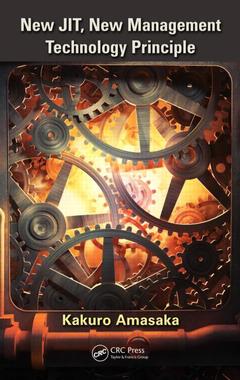Description
New JIT, New Management Technology Principle
Author: Amasaka Kakuro
Language: English
Subjects for New JIT, New Management Technology Principle:
Keywords
Business Process; Advanced Car Manufacturer; Kakuro Amasaka; Management Technology Principle; Just-in-Time quality management; Toyota Motor Corporation; Toyota Production System; Oil Seal; Productivity Improvement Model; Te Ch; Marketing Process Management; High Quality Assurance; Value Creation Model; CAE Analysis; Next Generation Toyota Production Model; Customer Science; Da Ta; Data; Concurrent Engineering; Simultaneous Achievement; CAE Software; Overseas Production Base; Common Language; Assembly Makers; Task Team Activities; Buffer Number; Im Pr Ov Em; Japanese Domestic Production; Cutting Speed; Threaded Portion; Standard Operation
· 15.6x23.4 cm · Hardback
Description
/li>Contents
/li>Readership
/li>Biography
/li>
New JIT, New Management Technology Principle contains the previously published, updated, and new works of renowned scientist, scholar, and consultant Kakuro Amasaka. This book details the Just-in-Time (JIT) quality management strategy, exploring the cutting edge of a new management technology principle that surpasses what traditional JIT has accomplished. The new JIT principle contains hardware and software systems, and next-generation technical principles for transforming management technology into management strategy. This comprehensive work covers traditional JIT, innovation and evolution, the full new JIT and its applications, along with case studies.
It is clearly impossible to lead the next generation by merely maintaining the two Toyota management technology principles, Toyota Production System and Total Quality Management. To overcome this issue, it is essential to renovate not only TPS, which is the core principle of the production process, but also establish core principles for marketing, design and development, production, and other departments. This book reassesses the way management technology was carried out in the manufacturing industry and establishes new JIT. This next-generation management technology model is the JIT system for not only manufacturing, but also for customer relations, sales and marketing, product planning, research and development (R&D), product design, production engineering, logistics, procurement, and administration and management for enhancing business process innovation and introduction of new concepts and procedures.
The book focuses on the theory and application of strategic management technology through the application of new JIT, then demonstrates its effectiveness in a case study based on an advanced car manufacturer. Using this new model, you can realize manufacturing that places top priority on customers with a good Quality, Cost, and Delivery (QCD) in a rapidly changing technical environment, and allows you to create uniform quality for the global market.
Introduction. Management Tasks of Manufacturing Companies Shifting to Global Production. Basics of JIT: The Toyota Production System. Innovation of Manufacturing Fundamentals Surpassing JIT. New JIT, New Management Technology Principle. Driving Force in Developing New JIT. Strategic Development of New JIT. Advanced Total Development System, Total Production System, and Total Marketing System: Key to Global Manufacturing Strategy. Innovative Deployment of an Advanced Total Development System, Total Production System, and Total Marketing System. New Manufacturing Management Employing New JIT. Conclusion.
Dr. Kakuro Amasaka was born in Aomori Prefecture, Japan, on May 5, 1947. He received a Bachelor of Engineering degree from Hachinohe Technical College, Hachinohe, Japan, in 1968, and a Doctor of Engineering degree specializing in Precision Mechanical and System Engineering, Statistics and Quality Control from Hiroshima University, Hiroshima, Japan, in 1997. Since joining Toyota Motor Corp., Japan, in 1968, Dr. Amasaka worked as a quality management consultant for many divisions. He was an engineer and manager of the Production Engineering Div., Quality Assurance Div., Overseas Engineering Div., Manufacturing Div., and TQM Promotion Div. (1968-1997), and the General Manager of the TQM Promotion Div. (1998-2000).
Dr. Amasaka became a professor of the College of Science and Engineering, and the Graduate School of Science and Engineering at Aoyama Gakuin University, Tokyo, Japan in April 2000. His specialties include: production engineering (Just in Time and Toyota Production System), statistics science, multivariate analysis, reliability engineering and information processing engineering. Recent research conducted includes: "Science SQC, New Quality Control Principle", "Science TQM, New Quality Management Principle", "New JIT, New Management Technology Principle", Customer Science, Kansei Engineering and numerical simulation (computer aided engineering).
Positions in academic society and important posts: He is the author of a number of papers on strategic total quality management, as well as the convener of JSQC (Journal of Japanese Society for Quality Control), JOMSA (Japanese Operations Management and Strategy Association), JIMA (Japan Industrial Management Association), JSKE (Japan Society of Kansei Engineering), and other academic society (e.g. POMS and EurOMA). He has been serving as the vice chairman of JSPM (2003-2007) and JOMSA (2008-2010), the director of JSQC (2001-2003), the chairman of JOMSA (2011-2012), and the commissioner of the Deming Pr
These books may interest you

Just-in-Time for Operators 208.65 €



